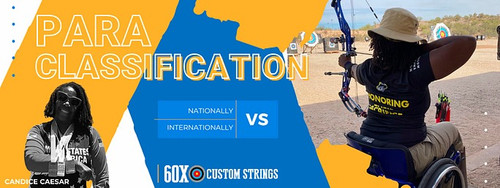Para Archery Classification & Adaptive Archery Equipment
Posted by Caesar Candice on Feb 19th 2024
If I am disabled, do I have to get a para classification to shoot archery?
Often, people with disabilities want to get classified to participate in archery. You do not have to have a classification to participate.
In the United States, USA Archery has a policy for adaptive equipment.
What is adaptive archery equipment?
Adaptive equipment is authorized to match the level of impairment and is not to be authorized to enhance performance. Sometimes, it is difficult to balance the athlete’s request for adaptive equipment and their need for it based on their impairment.
USA Archery's document states that archers are not required to be classified as a para archer to shoot from a wheelchair or stool due to injury or disability while competing in a non-para division at a USA Archery-sanctioned event. Likewise, archers using temporary mobility aids such as a knee scooter, crutches, etc., or a service animal are not required to be classified. There are rules for the size and height of the wheelchair that follow World Archery rules.
Each federation has its own rules and regulations about adaptive archery equipment. Seek out that information for your prospective federations.
Visually impaired classification assessments are only carried out by international classifiers from the International Blind Sports Association.
What are the para archery sports classes?
- W1 (women/men)
- Compound Open/Recurve Open (women/men). This class includes those in wheelchairs and standing archers.
- Visually Impaired (gender combined)
Why should I get a para classification?
Archers who want to compete in a para division nationally must have, at minimum, a current para national classification and their classification card with them at events where they are registered to compete in a para division. Each national archery federation may or may not have its own rules for para archery competitions and the classification of impaired athletes, based on the World Archery international rules.
Para athletes who want to compete at an international World Ranking Event must have an international classification card and have it with them at the event. A panel of at least two international classifiers from different countries must follow the procedures detailed in the Classifier's Handbook to determine whether an athlete is eligible to use an assistive device or compete in a para archery category.
What is the purpose of a para classification in archery?
Classification provides structure and a level playing field to the competitions.
What is para classification?
Para classification is the process of assessing athletes according to the International Paralympic Committee’s classification standards that span all para sports.
In para archery, this process includes reviewing medical documentation that you must submit before your classification appointment and a physical examination. During this process, the classifiers determine whether an athlete can use an assistive device (everything from stools and wheelchairs to custom release aids) and other adaptive archery equipment. Classification also determines whether they are eligible to compete in para archery. This process also categorizes eligible athletes into groups by the severity of their impairment.
What are eligible impairments?
Per the current IPC Code and Classification Rules, individuals are eligible to compete based solely on their eligible medical condition as identified on their medical intake forms completed by their physicians. These impairments must be identified as PERMANENT:
- Impaired muscle power
- Impaired passive range of movement
- Loss of limb or limb deficiency
- Hypertonia
- Ataxia
- Visual Impairments
Examples of non-eligible impairment types for all athletes include, but are not limited to, the following:
- Pain
- Low muscle tone
- Hypermobility of joints
- Joint instability, such as unstable shoulder joint or recurrent dislocation
- Impaired motor reflex functions
- Impaired muscle endurance
- Impaired cardiovascular or respiratory functions
- Impaired metabolic functions
- Tics and mannerisms, stereotypes, and motor perseveration
Athletes with a health condition or impairment that does not have an Eligible Underlying Health Condition will not be eligible to compete in para archery.
These include those that primarily:
- Cause pain (e.g. myofascial pain dysfunction syndrome, fibromyalgia, or complex regional pain syndrome)
- Cause fatigue (e.g. chronic fatigue syndrome)
- Cause hypermobility or hypotonia (e.g. Ehlers-Danlos syndrome)
- Psychological or psychogenic in origin (conversion disorders or post-traumatic stress disorder)
Things I wish I had known before getting an international classification:
While you may get a national classification, it is possible to not obtain an international classification. If this happens, you will lose your national classification status. A coach cannot tell you if your disability is classifiable.
How much does a classification cost?
It depends on the event. Nationally, the cost would include event registration, air and ground transportation, hotel, and food. If you require an assistant, you would also need to pay for the transportation and accommodations for them, as well. The rules state you must carry an arrow agent with you. If you are classified at a USAT event, you must also have a current Safe Sport background check for you and your agent.
At an international event, you must pay for event registration, travel insurance, air and ground transportation, hotel, food, uniforms for the US delegation, and the personal coach fee for your coach/agent. You must also have a current Safe Sport background check for you and your agent. You will arrive before the delegation arrives and will have to cover additional lodging and food costs.
Should I get classified nationally?
It depends on your goals. If you aspire to be on the team, you can work hard and get the minimum qualification scores before competing for a team spot in your prospective category.
Should I get classified internationally?
Yes, if you can make the qualification standards to rank in the top 3 of your prospective category to receive funding while planning to compete internationally. If you are unable to meet the minimal qualifications for the team standard, international classification would not be advisable. Save your money and compete locally until you can get your score up. Your first step should be to get a national classification. Don’t bypass this step, if at all possible.
Where can I find information on Para Archery Classification?
USA Archery Policies for Wheelchairs, Adaptive Archery Equipment, and Service Animals








